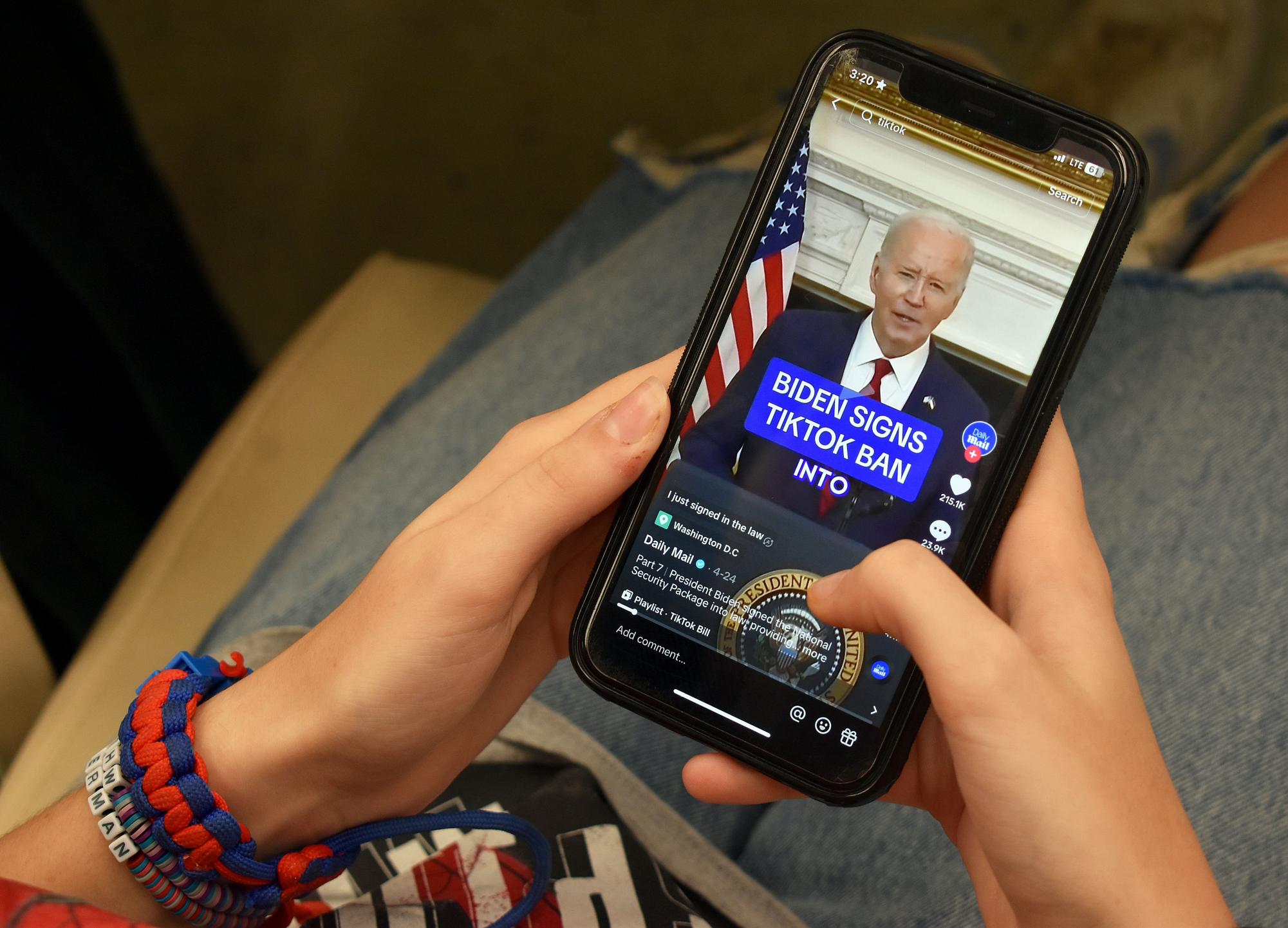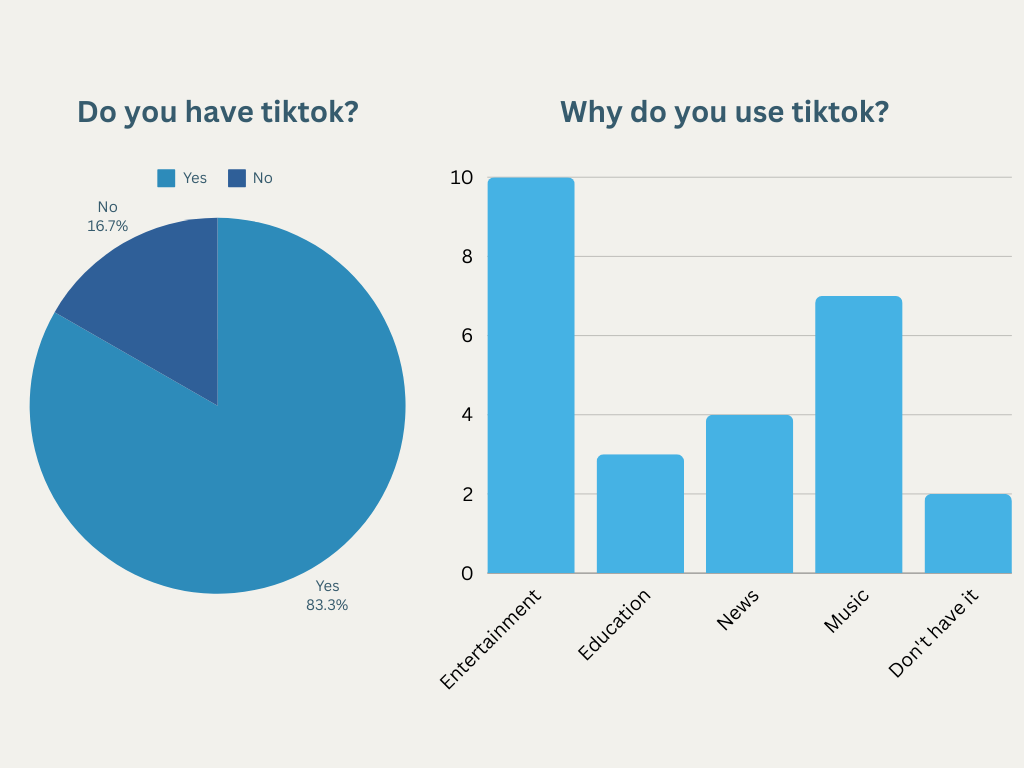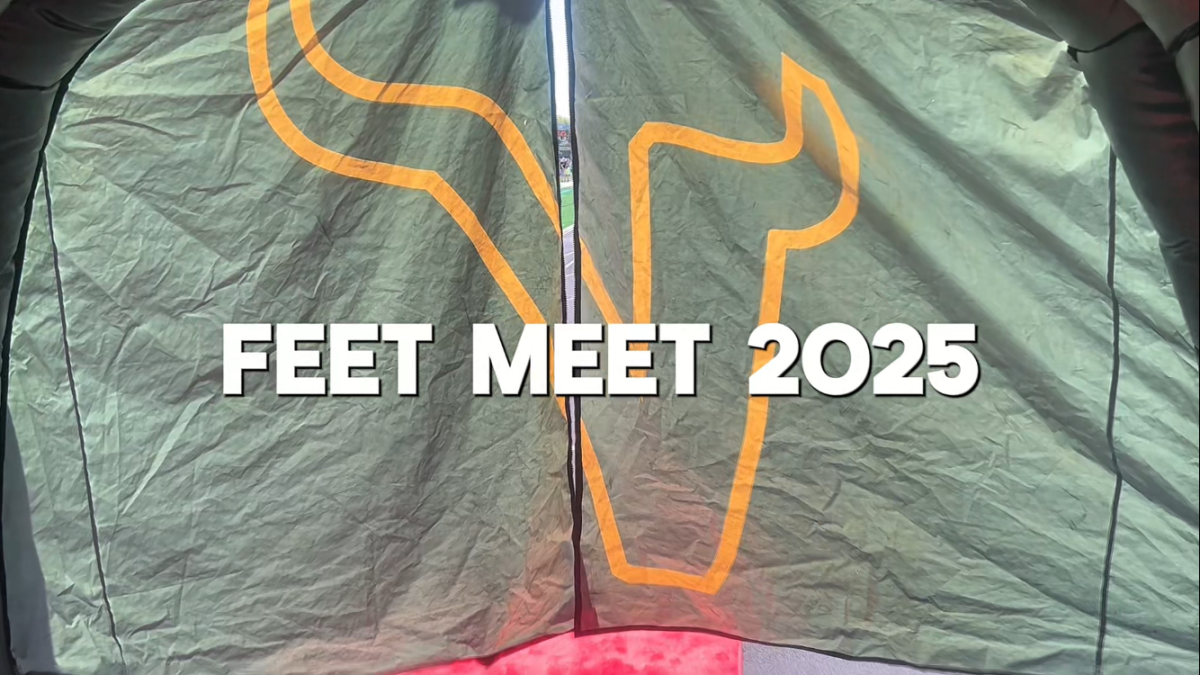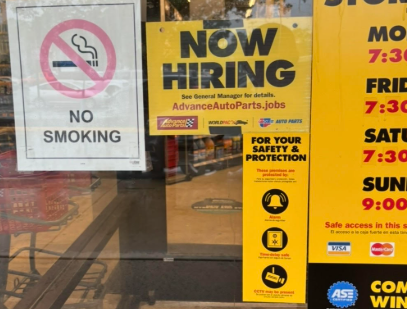Zoned In: Biden Signs on TikTok Ban

The potential removal of TikTok from the American public has kept users and content creators alike on high alert.
Congress passed legislation that could lead to a potential ban of TikTok on April 23, with Biden signing off on the bill the following day. This legislation forces ByteDance — the Chinese parent company of TikTok — to sell the social media platform to a government-approved buyer within nine months or face a nation-wide ban.
Here’s what to know:
Why is this legislation being put into place?
Concerns over the Chinese government having access to American user data through TikTok has been a consistent uncertainty since the app became available in the U.S. in 2018. Recent tensions between the American and Chinese government have amplified the uneasiness around what potential harm sensitive user data, such as location data and personal information, could inflict if it were exploited.
Government officials also expressed worry about the app’s ability to use content recommendations to spread misinformation. This concern has grown since the beginning of the Israel-Hamas conflict and the fast approaching 2024 presidential election.
What would the ban look like?
Despite what users think, the potential TikTok ban won’t make the app vanish off of your phone, but it will disappear from app stores like Apple and Google and will not be available for downloading. Companies with internet hosting will also be barred from distributing or maintaining TikTok.
Although existing users won’t have the app deleted off their phone, users will not be able to update the application in America. Under these circumstances, the app will eventually become an unusable security risk.
What kind of response is it receiving?
Two days after Biden signed the bill into law, ByteDance released a statement saying that it doesn’t have plans to sell TikTok, while also repeatedly denying claims that the Chinese government has control over the company.
ByteDance has also filed a lawsuit against the federal government, calling the bill unconstitutional under the First Amendment.
The conflict has also raised public opposition. Users challenge the ban in favor of digital rights and freedom of expression. Content creators who base their livelihoods on the platform have spoken out against the legislation — a few have gone on to file lawsuits of their own.
Of those interviewed, ten students said they used TikTok for entertainment, three said they used it for education, four said they used it for news, seven said they used it for music and two said they don’t have it.
Freshmen
Liam Altenburger: “Personally, I’ve never had TikTok. My dad didn’t like the idea of my information being used on a Chinese platform. But I didn’t care, as I find Instagram Reels better. If TikTok doesn’t sell to an American company, I’ll use Instagram Reels. YouTube Shorts or something like those will fill the void.”
Brianna Tulowitzky: “I think the TikTok ban is honestly pointless. Especially with this newer generation, there is always going to be a platform for people to do the same things they did on TikTok. Also, TikTok is a place where people can share information about so many different topics and often faster than you would get elsewhere. So many people use the app that I’m not sure that a ban could be possible without some sort of upset from the users.”
Sophomores
Richie Ring: “I personally think it’s embarrassing for our government to be worrying about that when there’s so many other things for it to be worrying about. There’s a whole war going on with people getting killed, and we’re worried about an app that might be selling our data. I think it says a lot about the maturity level of the government, worrying about something that’s rather childish when there’s real world issues that we can help with.”
Julie Collins: “I feel that the ban will not affect me too much. I already use Instagram more than TikTok and feel that TikTok being banned will not change my life or my time on social media.”
Juniors
Carson Leigh: “Personally, I use Instagram Reels more often than I use TikTok, so if TikTok was banned it wouldn’t really affect me much. However, I know a lot of people would be upset about TikTok being banned as it is really popular. I don’t think it should be allowed to be banned because it’s social media and free speech.”
Lindsay Semiao: “Honestly, I support the TikTok ban. It’s very distracting from real life and it’s just another unsafe place for kids, especially young kids who don’t know what internet safety is. It takes people’s focus off what is important like school, work, family and friends, and keeps their focus on likes, followers and mind-numbing videos.”
Seniors
Jordan Ayres: “Honestly, I have very mixed feelings about it. On one hand, myself and others use and enjoy the app. For some people it is even a source of income and a way to engage in free speech. So it upsets me that people will get that taken from them. On the other hand, there are many people who overuse the app or use it for the wrong reasons. So I feel like it being taken away will be good for those reasons. At the end of the day, it’s just an app and it’s not the end of the world.”
Logan Buckley: “I am so in favor of the TikTok ban and I have been since 2020 when it was first being discussed. Yes, there’s the potential that it could pose as a threat to our national security, but I don’t know all of the logistics to really get into that. What I do know is that TikTok has ruined our culture. As a musician, it’s been heartbreaking to watch the music in our culture completely deteriorate and become emotionless goo. Nobody makes music from the heart it seems, everything is with the intent of getting that 30 second sound bite to go viral. “
The US Senate passed a bill in favor of a nation-wide TikTok ban on April 16 due to concerns of national security risks with the app’s Chinese parent company: ByteDance. Such legislation was then approved by President Joe Biden on April 24.
However, this isn’t the first time America has undergone a potential TikTok ban, but it is the first time a president has signed it into law, making it official. Former President Donald Trump proposed a similar TikTok ban by executive order in 2020, but these efforts were never final. Other attempts to ban the app have been made at state levels as well.
Governor Greg Gianforte of Montana attempted to do this back in March when he signed a bill to ban the app at a state level. TikTok shot back, however, filing against this by claiming that such legislation violates the first amendment.
However, Biden’s signature ensures a nationwide ban of TikTok unless the short-video app is to be sold away from its Beijing-based parent company and sold to an American one.
Responses to this endeavor are mixed, just as they had been with previous attempts. But now that it’s official, public opinions — mostly those in opposition to this ban — are heightened. A ban, however, may not be the doomsday scenario that many are painting it to be.
The most common reason for opposition to a TikTok ban ties in the First Amendment and potential free speech violations, many claiming that a new American parent company could hinder TikTok’s policies and censorship, changing what creators would be allowed to share.
However, we must think of the actual likelihood of this happening. The primary reason for this ban is due to national security concerns with China having access to every user’s personal data and information, and thus, being able to spread propaganda — and not as a means to restrict or limit free speech of any manner.
It seems that this claim of TikTok’s removal being an infringement on freedom of speech clings onto a surface level understanding of the Constitution, moreover, that the Constitution has no right to ban the right of free speech. That part is correct, but the banning of TikTok doesn’t actually ban free-speech in the way many are claiming. While the effects of a ban may be limiting in some sense, it doesn’t outrightly ban or limit freedom of speech given that there are several other mediums and outlets for free speech, all of which the government isn’t trying to ban or limit.
Additionally, freedom of speech is a negative right. While the government cannot deny anyone’s right to free speech away, it is in no way required to provide a means in which to do so, in this case to TikTok.
Another popular opinion is that the TikTok ban will take away a vital platform for many small businesses and influencers. And to that I would apply the same principle: While this ban may limit one’s business or online influence, it doesn’t take away their job in the slightest bit, due to the many other platforms available.
An alternative would be Instagram, specifically their increasingly used ‘reels’, their equivalent to TikTok. Many TikTok influencers have started integrating their content into reels, and many have found larger success on Instagram when it comes to pay and monetization, making Instagram a better candidate for small businesses and content creation.
And anyway, the banning of TikTok won’t take away our country’s leisure scrolling habits given that almost every other mainstream social media as some sort of short-video tab embedded on their platform. Perhaps, this ban could have positive effects when it comes to tackling addictive scrolling or overuse of social media.
It seems that many are masking their opposition to a TikTok ban with concerns for potential risks of free speech or the stakes that small businesses will have to bear, when in reality, it is most easily traceable to the fact that our country has formed an attachment to leisure scrolling. Tiktok has found itself as an integral part of our pop culture, and seeing it go with this ban — given that it is not divested away from ByteDance — has reasonably upset American masses.
But when it comes to protecting our national security from possible threats or maintaining a popularly used app, one surely takes precedence over the other.
Your donation will support the student journalists of Loudoun Valley High School. Your contribution will allow us to purchase equipment and cover our annual website hosting and publishing costs.












